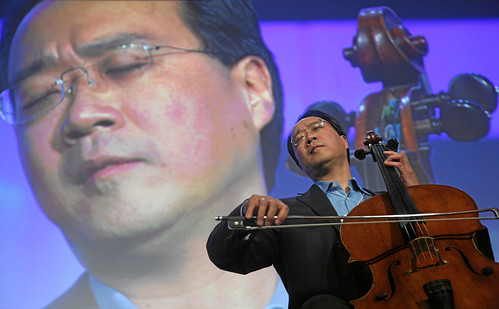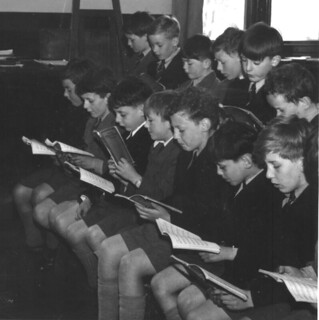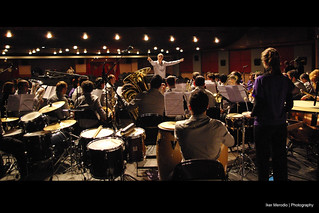
The teacher complaints go something like:
"Why are my kids looking around the room instead of at their music?"
"Why are my kids dragging?"
"Why are my kids ignoring all the markings?"
Are you ready for the answer? .....................Because your kids are lost.
Your kids can't read music.
Now, they may be able to tell you the name of a note when you point at it (given enough time). Or your trumpet section might be able to (slowly) tell you the names of notes in the next phrase, but what I'm talking about is individual fluency. The ability to process names of notes instantly.
Your kids probably can't do that. Not at the tempos you are asking them to maintain in rehearsal.
Don't believe me? Next rehearsal, choose students at random to say the names of the notes out loud at the tempo you have been rehearsing. Choose different kids on different parts so they can't just repeat what they just heard from someone else.
What did you notice? Yeah. They can't process the note names instantly with 100% accuracy. So, if you were those kids, and the teacher was rehearsing faster than you could process, what would you do?
- Write in the names of the notes (or fingerings)
- Look at the kid next to you to memorize the fingering pattern
- Learn the tune by ear
- Slow down
And so it goes. Students learn these survival tactics because that's the only way they can participate "successfully" during the rehearsal. When you reprimand them for looking away from their music, all that results in is a student blankly staring at the page while having no idea where they are. They are lost because they simply can't keep up.
Eventually their survival tactics result in the banding sounding OK by the time the concert rolls around. Then, after the concert you pass out a new piece and "Wow, it's like they didn't retain anything!"
Been there? Yeah, me too.
So...what is the solution? You probably won't like it. Let me start by talking about what the solution is not:
- Having the students fill in a handout of notes (writing the names below each note)
- Reciting names of notes out loud on occasion, as a group
- Memorizing the names of the lines and spaces
Filling in worksheets is far too slow a task. Students won't develop fluency that way (though you could use it for a timed summative). Doing anything as a group will always allow the kids who are struggling to hide. And separating the staff into two things (lines and spaces) actually makes note recognition take longer. Not to mention it becomes rather useless when dealing with ledger lines.
The solution is to rehearse less. You read that right. Less rehearsal, in conjunction with a sequenced, challenging, data-driven (yep, I said it) process for helping students to make note recognition second nature. Instantaneous.
Once students have truly conquered:
- Note recognition over the full range of the instrument
- Enharmonic equivalents
- Key signatures
- Scale spelling
Then you have given them a fighting chance to consider:
- Rhythm
- Fingerings
- Dynamic markings
- Blend
- Intonation
And all the other aspects of musicianship that we want them to know and be able to do. Honestly, when I hear teachers expressing concern about (for example) their band's lack of pulse control and rhythmic accuracy, I ask myself "I wonder if those kids can read names of notes." Because maybe it's not the rhythm, maybe they are lost/playing by ear/just trying to survive. Help those kids to become fluent at note reading, and suddenly the other things start to improve.
And I'm not just talking about beginners. At my school, we spend a full class period every week with our 9th graders on music literacy. Every. Week. What do we use? We use my NoteNames+ iOS app. But you don't even need to use technology. When I was teaching in the early 90s I used handmade flash cards and put students in pairs. They had to get through the whole stack of flashcards in a certain amount of time in order to be considered fluent. So don't let the lack of technology stop you! Just make sure there is and expectation, and accountability. And you have to do it regularly, all year.
Of course, the advantage of NoteNames+ is that it provides a graduated approach that results in a sense of urgency. And the Google Docs data reporting allows us to refine instruction, expectations, and summarize progress. You can do some of these things with sites like musicracer.com, tonesavvy.com and musictheory.net as well (though maybe not for free when it comes to data reporting).
And by the way, there is nothing about note reading that is difficult. Beginners should be taught to read the full range of their instrument. You don't need to wait until they need to play those notes before learning to read them. It's just the alphabet! Take a look at the complexity of any video game that 10 year olds play today and tell me they can't learn the alphabetical nature of the staff.
The bottom line is that note recognition needs to be instant so kids can consider everything else we expect them to be attending to. Would an English teacher expect kids to read aloud at a quick pace if they barely knew the letters they were looking at? Would the teacher have the class "read aloud" as a group and just keep going back to the beginning and try again and again? If they class could eventually say a sentence aloud all together, would that mean each child could read? No, that would be a rather silly conclusion. Yet how often do we put music in front of kids, count off a tempo, and expect them to magically keep up? We go back to the top and have them play it again, and again, and again, until it sounds good. Should we assume that each child is actually reading now? Hm.
Put the instruments in the cases and spend regular time explaining the alphabetical nature of the staff, how enharmonic notes are structured, how sharps and flats are presented on the staff, and then give kids tools to develop fluency of recognition. Then put the horns together. Do this once per week and you'll find that you have not wasted time, you've invested it.
]]>


























